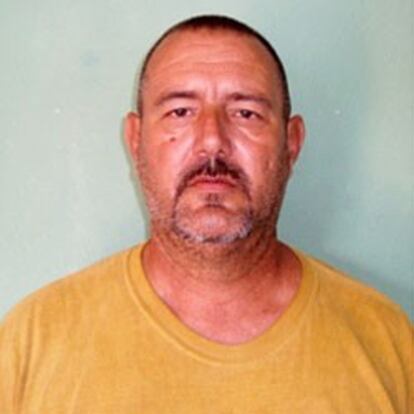Cuban dissidents denounce activist's death from police beating
Government blames "counter-revolutionaries" for "fabricated" news reports
Human rights activists and Cuban exiles around the globe have expressed anger and concern following the death last Sunday of dissident Juan Wilfredo Soto García, who was reportedly beaten by police officers after he was taken into custody in the city of Santa Clara.
Soto, 46, was part of a small dissident group called the United Anti-Totalitarian Pole, of which Guillermo Fariñas, the European Parliament's 2010 Sakharov Prize winner, is also a member. Fariñas called Soto's death "a murder."
The opposition activist was arrested on May 5 at the Leoncio Vidal Park in Santa Clara where, according to other dissident sources, several police officers beat him "brutally" in front of witnesses at the time of his arrest.
Regime opponents claim that it was these blows, and not the chronic illnesses that he was suffering from, that led to his death. The Cuban government on Monday denied that Soto's death was caused by a police beating and accused "counterrevolutionaries" and the foreign media of "fabricating lies."
The Provincial Hospital of Santa Clara, where Soto died after spending two days in critical condition, reported "pancreatitis" as the cause of his death, although there will not be any official ruling until a medical certificate is issued within 15 days.
Speaking from the funeral in Santa Clara, attended by relatives and members of the opposition on Sunday, Fariñas spokeswoman Lissette Zamora said Soto was a diabetic and had once suffered a heart attack. But she insisted that his death was a result of the injuries from "the beating" he received.
According to other dissidents, Soto was sitting in the city's main park when the police demanded that he leave. When he refused, he was reduced by force, handcuffed and beaten. Zamora said the police later took him to hospital where he was treated and sent home. Hours later he began to feel ill and a fellow member of the opposition brought him back to hospital, where he spent two days in critical condition until he died in the early hours of Sunday.
Hunger strikes
"It's a crime and it's a murder, and the government is responsible for encouraging police brutality. He was handcuffed when he received the blows, and at that park there are people watching on behalf of the political police in Santa Clara," Zamora said.
Fariñas, a dissident journalist who has attained worldwide renown for his series of hunger strikes in protest at the autocratic Cuban regime, said dissidents will not allow "this murder to go unpunished," and called for a "unanimous condemnation by the international community."
For her part, Martha Beatriz Roque, another dissident leader, likened the case to that of Orlando Zapata Tamayo, who died last year after an 85-day hunger strike. Yoani Sánchez, a celebrated blogger, said on her Twitter account that "this violent police incident is not an isolated case."
Separately, the Cuban government announced this week that it would make it easier for its citizens to travel abroad as tourists. The new rules are part of a set of reforms that were proposed during last month's Sixth Communist Party Congress. At present, Cubans must apply for a travel permit, called the "white card," which costs about $130.

Tu suscripción se está usando en otro dispositivo
¿Quieres añadir otro usuario a tu suscripción?
Si continúas leyendo en este dispositivo, no se podrá leer en el otro.
FlechaTu suscripción se está usando en otro dispositivo y solo puedes acceder a EL PAÍS desde un dispositivo a la vez.
Si quieres compartir tu cuenta, cambia tu suscripción a la modalidad Premium, así podrás añadir otro usuario. Cada uno accederá con su propia cuenta de email, lo que os permitirá personalizar vuestra experiencia en EL PAÍS.
¿Tienes una suscripción de empresa? Accede aquí para contratar más cuentas.
En el caso de no saber quién está usando tu cuenta, te recomendamos cambiar tu contraseña aquí.
Si decides continuar compartiendo tu cuenta, este mensaje se mostrará en tu dispositivo y en el de la otra persona que está usando tu cuenta de forma indefinida, afectando a tu experiencia de lectura. Puedes consultar aquí los términos y condiciones de la suscripción digital.








































